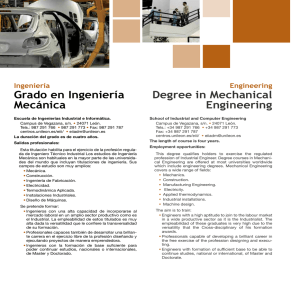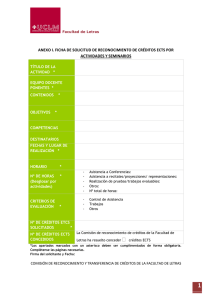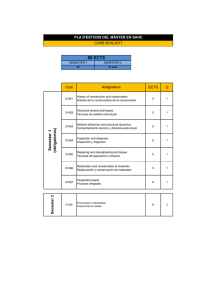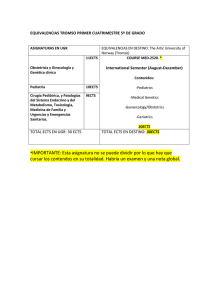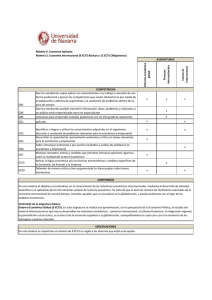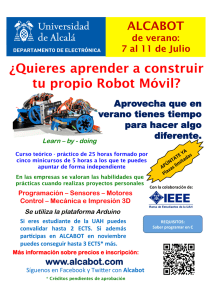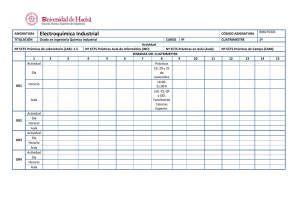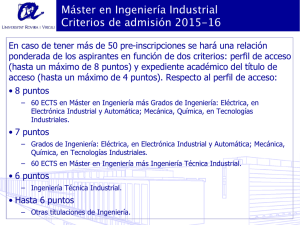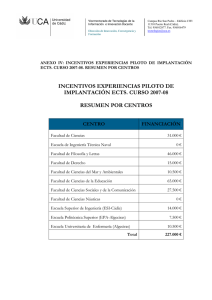Grado en Ingeniería Informática Degree in Computer Engineering
Anuncio
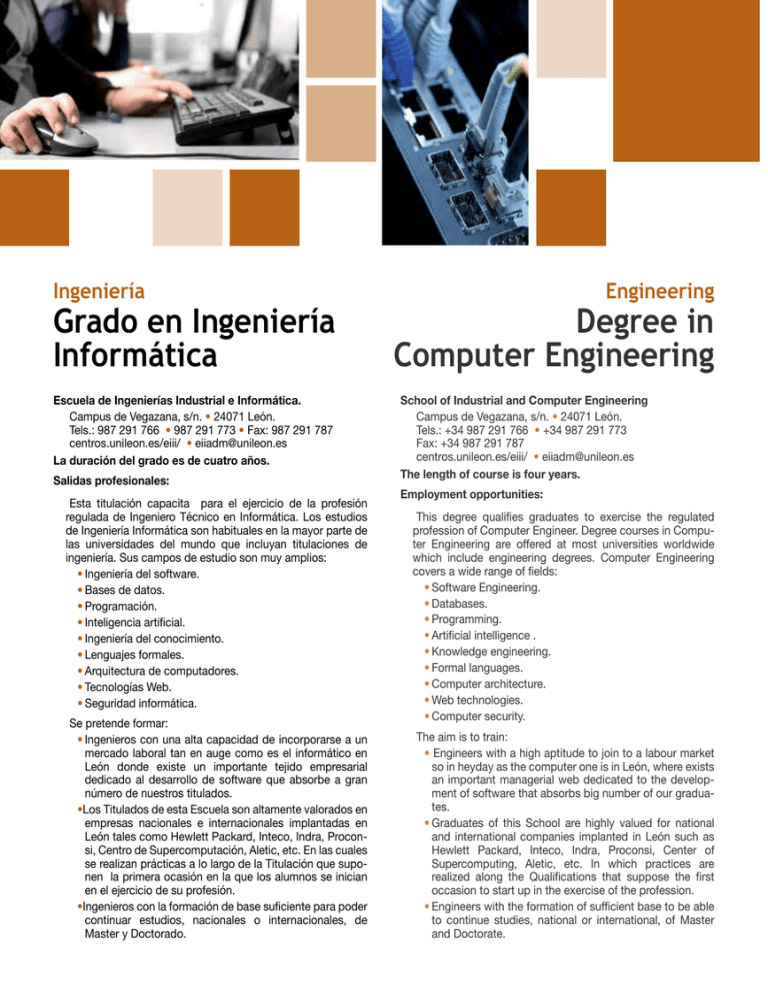
Ingeniería Grado en Ingeniería Informática Escuela de Ingenierías Industrial e Informática. Campus de Vegazana, s/n. • 24071 León. Tels.: 987 291 766 • 987 291 773 • Fax: 987 291 787 centros.unileon.es/eiii/ • [email protected] La duración del grado es de cuatro años. Salidas profesionales: Esta titulación capacita para el ejercicio de la profesión regulada de Ingeniero Técnico en Informática. Los estudios de Ingeniería Informática son habituales en la mayor parte de las universidades del mundo que incluyan titulaciones de ingeniería. Sus campos de estudio son muy amplios: • Ingeniería del software. • Bases de datos. • Programación. • Inteligencia artificial. • Ingeniería del conocimiento. • Lenguajes formales. • Arquitectura de computadores. • Tecnologías Web. • Seguridad informática. 18 Se pretende formar: • Ingenieros con una alta capacidad de incorporarse a un mercado laboral tan en auge como es el informático en León donde existe un importante tejido empresarial dedicado al desarrollo de software que absorbe a gran número de nuestros titulados. •Los Titulados de esta Escuela son altamente valorados en empresas nacionales e internacionales implantadas en León tales como Hewlett Packard, Inteco, Indra, Proconsi, Centro de Supercomputación, Aletic, etc. En las cuales se realizan prácticas a lo largo de la Titulación que suponen la primera ocasión en la que los alumnos se inician en el ejercicio de su profesión. •Ingenieros con la formación de base suficiente para poder continuar estudios, nacionales o internacionales, de Master y Doctorado. Engineering Degree in Computer Engineering School of Industrial and Computer Engineering Campus de Vegazana, s/n. • 24071 León. Tels.: +34 987 291 766 • +34 987 291 773 Fax: +34 987 291 787 centros.unileon.es/eiii/ • [email protected] The length of course is four years. Employment opportunities: This degree qualifies graduates to exercise the regulated profession of Computer Engineer. Degree courses in Computer Engineering are offered at most universities worldwide which include engineering degrees. Computer Engineering covers a wide range of fields: • Software Engineering. • Databases. • Programming. • Artificial intelligence . • Knowledge engineering. • Formal languages. • Computer architecture. • Web technologies. • Computer security. The aim is to train: • Engineers with a high aptitude to join to a labour market so in heyday as the computer one is in León, where exists an important managerial web dedicated to the development of software that absorbs big number of our graduates. • Graduates of this School are highly valued for national and international companies implanted in León such as Hewlett Packard, Inteco, Indra, Proconsi, Center of Supercomputing, Aletic, etc. In which practices are realized along the Qualifications that suppose the first occasion to start up in the exercise of the profession. • Engineers with the formation of sufficient base to be able to continue studies, national or international, of Master and Doctorate. Plan de estudios Syllabus PRIMER CURSO Primer semestre FIRST YEAR ECTS • Calculo diferencial e integral • Matemática Discreta • Física • Electrónica • Inglés 6 6 6 6 6 Segundo semestre ECTS • Álgebra • Métodos Numéricos y Estadístico • Estructura de Computadores • Programación I • Fundamentos de Administración de Empresas Créditos Primer Curso 6 • Programación II • Bases de Datos • Sistemas Operativos • Algoritmos y Grafos • Sistemas de Información I Segundo semestre • Introducción a los Sistemas Inteligentes • Ampliación de Sistemas Operativos • Estructuras de Datos • Arquitectura, Diseño y Gestión de Redes • Arquitectura de Computadores Créditos Segundo Curso • Ingeniería del Conocimiento • Ingeniería del Software I • Dirección de Proyectos • Sistemas Distribuidos • Servicios de Internet Second Semester 6 60 Total First Year Credits 6 6 6 SECOND YEAR ECTS 6 6 6 6 6 ECTS First Semester • Programming II • Databases • Operating systems • Algorithms and graphs • Information systems I Second Semester 6 6 • Introduction to intelligent systems • Further studies in operating systems • Data structures • Network architecture, design and management • Computer architecture 60 Total Second Year Credits 6 6 6 TERCER CURSO Primer semestre • Differential and integral calculus • Discrete mathematics • Physics • Electronics • English • Algebra • Numerical methods and statistics • Computer structure • Programming I • Fundamentals of business administration SEGUNDO CURSO Primer semestre First Semester THIRD YEAR ECTS 6 6 6 6 6 First Semester • Knowledge engineering • Software engineering I • Project management • Distributed systems • Internet services En este plan de estudios se ofertan 72 ECTS de carácter optativo. El alumno sólo precisa cursar 36 ECTS de carácter optativo. Estos podrá obtenerlos por cualquiera de las siguientes vías: a. Cursando asignaturas optativas ofertadas en este plan de estudios. b. Eligiendo como optativas asignaturas de cualquiera de las titulaciones de grado que se impartan en esta Escuela, con la condición de que no pueden aparecer en su expediente competencias específicas repetidas. c. De acuerdo con el artículo 46.2.i) de la Ley Orgánica 6/2001, de 21 de diciembre de Universidades, los estudiantes podrán obtener reconocimiento académico en créditos por la participación en actividades universitarias culturales, deportivas, de representación estudiantil, solidarias y de cooperación hasta un máximo de 6 créditos del total del plan de estudios cursado. d. Los estudiantes podrán reconocer hasta un máximo de 6 créditos por la realización de prácticas externas (25 horas = 1 crédito LENGUA UTILIZADA • Español. • Inglés Segundo semestre • Seguridad Informática • Sistemas de Información II • Aplicaciones web • Optativa 1 • Optativa 2 Créditos Tercer Curso: ECTS 6 6 6 6 6 60 Total Third Year Credits ECTS First Semester CUARTO CURSO Primer semestre • Trabajo Fin de Grado • Complejidad Computacional • Accesibilidad • Optativa 3 • Optativa 4 Segundo semestre • Trabajo Fin de Grado • Procesadores de Lenguajes • Ingeniería del Software II • Optativa 5 • Optativa 6 Créditos Cuarto Curso: FOURTH YEAR 6 6 6 6 6 ECTS 6 6 6 6 6 60 OPTATIVAS Asignaturas • Sistemas de información de Gestión y BI • Computación Neuronal y Evolutiva • Arquitecturas específicas y Empotradas • Computación Grid y Supercomputación • Seguridad en redes de comunicaciones • Redes móviles e inalámbricas • Visión Artificial • Técnicas de Modelado Semántico en la WEB • Animación por Computador • Informática aplicada a la Automatización y Control • Innovación Tecnológica • Prácticas externas Second Semester • Computer security • Information systems II • Web applications • Optional subject 1 • Optional subject 2 • Final year project • Computational complexity • Accessibility • Optional subject 3 • Optional subject 4 Second Semester • Final year project • Language processors • Software engineering II • Optional subject 5 • Optional subject 6 Total Fourth Year Credits 0PTIONALS ECTS 6 6 6 6 6 6 6 6 6 6 6 6 Subjects • Management information systems and BI • Neural and evolutionary computing • Specific and embedded architectures • Grid computing and supercomputing • Communication network security • Cellular and wireless networks • Computer vision • Semantic Web modelling techniques • Computer animation • Computing applied to automation and control • Technological innovation • Work experience This degree course offers a total of 72 ECTS credits in optional subjects. Students need only take 36 ECTS credits in optional subjects. These can be obtained in any of the following ways: a. Studying optional subjects offered in this syllabus. b. Studying optional subjects offered on any of the other degree courses taught in this school, provided that specific competencies are not repeated in students' academic records. c. In accordance with Article 46.2.i) of the Organic Law 6/2001, of 21st December on Universities, students may obtain up to a maximum of 6 optional credits for participation in a range of university cultural, sporting, student representation, charity and cooperation activities. d. Students may also obtain a maximum of 6 credits for the completion of work experience (25 hours = 1 credit). LANGUAGES USED • Spanish • English
